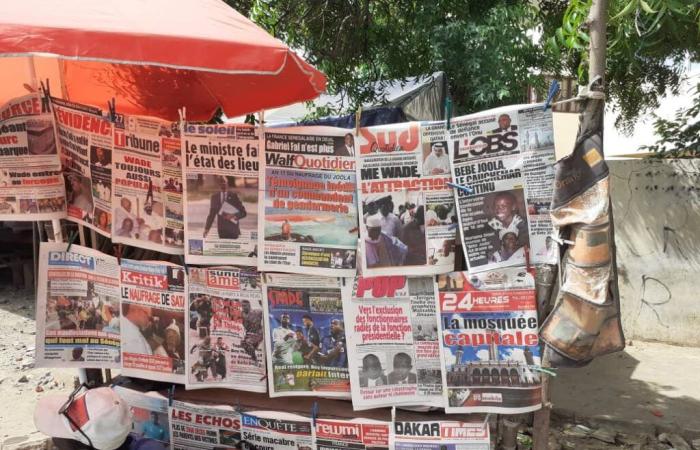Ouestafnews – The Senegalese media suffered from a difficult economic environment in 2024, according to Reporter Sans Frontières (RSF) which made public, on May 2, 2024, its annual report on the state of the press in the world. The government uses judicial and fiscal pressures against the media. However, the country has won 20 places in the ranking RSF compared to the previous year.
The “security environment” of the Senegalese press before the presidential election of March 2024 was “very difficult”, estimates Sadibou Marong, the director of the RSF regional office for West Africa.
Senegal experienced periods of strong tensions, between January and March 2024, marked by political violence due to the battle around the presidential election. The media paid their share of tribute in this violence.
As such, the RSF manager recalls the threats or assaults against several journalist or media including Babacar Fall Editor-in-chief of the Radio Futurs Médias (RMF, Privé), Habsa Hanne (Seneweb-Privé), Maimouna Ndour Faye, director of the 7TV (private) chain (private), etc.
After the victory of President Diomaye Fate in April 2024, he had a semblance of lull, but it was short-lived. Barely installed, the new government has, on the pretext of “regularization” submitted most of the private press companies to a strong tax burden for some, and to a requirement to “comply” to the press code, for others.
As soon as they came to power, the new authorities have enjoined the media to pay tax royalties from 2019 to 2023 and blocked bank accounts of some pushing certain companies to suspend their activities and others when stopped.
Before leaving power, President Macky Sall had publicly promised press companies to erase their tax debts from 2019 to 2023. According to media officials, most of these arrears dates from the period of the Cavid Pandemic 19 during which the media were also in difficulty.
Coming to power, the new authorities refused to apply this promise.
In addition to this tax pressure, several journalists have also been arrested for acts related to the exercise of their profession. At the end of May 2024, summons targeted the Directors of Publication of newspapers La Tribune and the daily, recalls RSF in its report.
This repressive trend of the new authorities continued with the arrests, arrests and legal proceedings against several other journalists or “columnists” in television programs. This was the case of Cheikh Yérim Seck, summoned and briefly detained, in early October 2024 for “for dissemination of false news and defamation”. He had refuted the figures put forward by the Senegalese government on the economic situation inherited from the previous administration.
But the most “emblematic” case, according to Sadibou Marong, is that of Simon Faye, the editor -in -chief of private radio Zik FM. Convened on April 10, 2025 and heard, it will be placed under judicial supervision after a period of grade in sight.
Invited to the launch of the RSF report, Mamadou Ibra Kane, the president of the Dissessor and Press Publisher Council (CDEPS), indicates that there are still “big attacks” to press freedom. He deplores a “harassment” of the police and the justice against journalists.
This is simply a desire for the power to control a “political issue” sector, said Mr. Kane, present during the presentation of the 2024 RSF report.
-This document falls into a context where the Senegalese press is with knives drawn with the new authorities. The tension mounted a notch after the publication, on April 25, 2025, of a decree enjoining the media deemed “non -compliant” to the press code to stop their activities.
The press bodies which are in this situation are required to obey the risk of “exposing themselves to sanctions”, had warned the document of the Minister of Communication. These “non -compliant” media are 358 out of 617 media recorded by their services, said HABIBOU DIA, director of communication, on April 29, 2024, during a press conference.
“We must comply with the law,” according to the director of communication. “In the media sector, this law is the press code,” defended Mr. Dia, director of communication.
For its part, the coordination of press associations (CAP) of Senegal urged, on April 29, 2025, Minister Alioune Sall jumped to his decision, denouncing “illegal criminalization” of media activity.
Questioned by Ouestaf News on the sidelines of the launching ceremony of the RSF report, the president of the CDEPS also a member of the CAP, believes that it is not a minister to decide that “such a company is in conformity or not”.
Difficult economic context
“The economic sustainability of the media is important,” said Sadibou Marong, recalling the authorities’ decision to return to the tax amnesty granted by the former head of state, Macky Sall, to the press bodies.
Since the arrival of Pastef (African patriots of Senegal for work, ethics and fraternity) in power, press companies deplore a strong tax burden and the suspension of the payment of claims due by the State to the media sector.
A fiscal and economic “suffocation” which “considerably reduces” journalistic activity, deplored Mamadou Ibra Kane. He accuses the authorities of wanting to “repress” press freedom through this “negation of existence” of press companies.
In this showdown with power, a “press without a press” was decreed by the media bosses to alert the economic difficulties of the sector on August 13, 2024. This mood movement had been followed by a good bet of the Senegalese private media.
Faced with this situation, the regional director of RSF calls for the state and the players in the press to “large consultations” to overcome these difficulties. According to RSF, out of 180 studied in 2025, 80 % face the “economic weakening” of the media.
One / FD / TS
Do you want to react to this article or report an error? Send us a message to Info (AT) Ouestaf.com.






